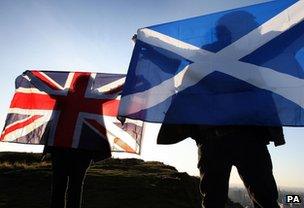Is brand Britain losing its lustre?
- Published
- comments

As Scotland considers pulling the plug on the Union, if the UK is really threatened it is probably from resentful Englanders more than belligerent Scots.
Team GB is limbering up for a year of unprecedented activity. Brass bands and bunting, anthems and ermine - Britain will be garlanded in red, white and (this year at least) blue as the Olympics and the Queen's Diamond Jubilee coincide to celebrate our sovereignty in extravagant and ostentatious style.
Flags will no doubt be enthusiastically waved, but 2012 will see the country in a period of uneasy self-reflection. Who are we and where are we heading?
Are we Europeans? As the eurozone struggles for survival, the UK has opted to step back from the melee. Should we instead, as Times commentator David Aaronovitch whimsically proposed recently, external, apply to become the 51st, 52nd, 53rd and 54th states of what might be known as the United States of America and the East Atlantic?
Ancient rivalries mean that, for many, France (34 European kilometres away) is culturally much more distant than the US (3,600 imperial miles away).
But as well as deciding whether we look East or West for friends and role models, the year ahead will see Britain question its relationship with itself. Do we even want to be British anymore?
The Celts have long been dubious about the idea. Ever since the Angles, Saxons and Jutes, formidable warriors from Germany, pushed the ancient indigenous Celtic tribes to the island's margins and classified them as aliens, they have had an understandably cool relationship with England and, subsequently, the United Kingdom.
The Anglo-Saxon word for foreign was Waelisc and foreign territory was Waelas. Thus the Brythonic (British) Celts were Welsh and lived in Wales. Those who fled to the South Western peninsula (cern in Celtic or cornu in Latin) lived in Corn-wall - the foreign land on England's horn.
The Pictish and Gaelic Celts of Scotland and Ireland were too much trouble for even the Romans to manage and so the extremities of the British Isles developed differently from England.
While the Scots, Irish and Welsh revelled in their separateness, England's cultural identity was based on the opposite - its importance in the wider United Kingdom and the world. While the Celts tended to look within their borders to describe themselves, the English looked beyond - identifying themselves, more often than not, as "British" and lamenting their diminished sense of imperial centrality.
Brand Britain, therefore, relies on England's enthusiasm for the concept. But there are signs that, even here, the British identity may be falling out of favour.
A recent poll suggested, external that just 20% of the UK population preferred to be described as British. What's more, according to that poll, the number of people in England who would now describe themselves as English rather than British stands at 63% - up from 41% in 2008.
Some neat graphics on the Guardian website, external recently looked at trends over time and, not including the figure above, revealed a volatile picture in terms of English enthusiasm for the British badge.
Asked to pick between British and English to describe themselves, only around half of people in England go for the former.
Today, the think-tank IPPR, external suggested that the "growing proportion of the population in England who prioritise their English over their British identity" thought it particularly unfair that Scottish MPs were able to vote at the UK Parliament on matters that affect only England, the so-called West Lothian question. Matters affecting only Scotland, of course, are decided by the Scottish parliament at Holyrood.
Their full report out later this month will suggest that the English identity is becoming politicised.
If IPPR is right and there is a trend towards people in England describing themselves primarily as English, then the UK and its relationship with the wider world may be up for grabs.
The president of the pollsters YouGov, Peter Kellner, recently noticed this, external: "When we compared the attitudes of 'English' compared with 'British' respondents, we found something odd. 'English' voters want to leave the EU by a margin of 58-26% - but 'British' voters favour remaining members by 46-37%."
"And while 'English' voters overwhelmingly prefer an isolationist foreign policy, 'British' voters divide fairly evenly between going it alone and doing compromise deals to tackle world problems."
Mr Kellner concludes that "what distinguishes people who call themselves 'English' is a passion for keeping other countries at arm's length".
The Scots may prefer to be Scottish, Englanders may be warming to the idea of being English, but I suspect that brand Britain will bounce back as voters consider the uncertain economic and diplomatic consequences of breaking apart in a scary financial climate. Tens of millions will be cheering Team GB this summer.